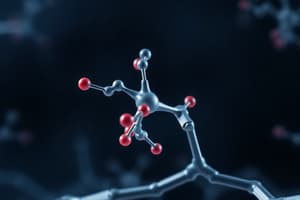Podcast
Questions and Answers
What are the two types of receptors that acetylcholine binds to at the synapse?
What are the two types of receptors that acetylcholine binds to at the synapse?
- Adrenergic and GABAergic receptors
- Dopaminergic and glutamatergic receptors
- Nicotinic and muscarinic receptors (correct)
- Serotonergic and nicotinic receptors
How does acetylcholine influence the neuromuscular junction?
How does acetylcholine influence the neuromuscular junction?
- By leading to memory formation
- By inducing action potential and triggering movement (correct)
- By causing visual processing
- By regulating dopamine levels
Which of the following cognitive processes is NOT influenced by acetylcholine's interaction with muscarinic receptors?
Which of the following cognitive processes is NOT influenced by acetylcholine's interaction with muscarinic receptors?
- Arousal
- Memory
- Emotional regulation (correct)
- Motivation
What role does acetylcholine play in synaptic plasticity?
What role does acetylcholine play in synaptic plasticity?
Which cognitive process relies on acetylcholine for critical periods of activity-dependent shaping?
Which cognitive process relies on acetylcholine for critical periods of activity-dependent shaping?
In what brain system does acetylcholine interact with muscarinic receptors to influence memory, motivation, arousal, and attention?
In what brain system does acetylcholine interact with muscarinic receptors to influence memory, motivation, arousal, and attention?
What type of ions do nicotinic acetylcholine receptors facilitate the flow of across the cell membrane?
What type of ions do nicotinic acetylcholine receptors facilitate the flow of across the cell membrane?
Which type of acetylcholine receptor is linked to G proteins and activates intracellular signaling pathways?
Which type of acetylcholine receptor is linked to G proteins and activates intracellular signaling pathways?
Which subtype of muscarinic receptors plays a role in regulating acetylcholine release at pre-synaptic locations?
Which subtype of muscarinic receptors plays a role in regulating acetylcholine release at pre-synaptic locations?
Where are postsynaptic acetylcholine receptors found?
Where are postsynaptic acetylcholine receptors found?
What physiological processes are influenced by the actions of acetylcholine receptors?
What physiological processes are influenced by the actions of acetylcholine receptors?
Study Notes
Acetylcholine: Its Actions Around the Synapse
Acetylcholine (ACh) is a crucial neurotransmitter with diverse roles in the body. It plays essential functions in the nervous system, including modulating synaptic plasticity, neuronal development, and influencing brain systems such as the mesolimbic dopamine system and addiction. Here, we explore the actions of ACh around the synapse.
Facets of Acetylcholine Interaction at the Synapse
At the synapse, ACh binds to either nicotinic or muscarinic receptors, depending on the organ system where it is acting. These interactions can lead to different outcomes. At the neuromuscular junction, ACh binding causes an action potential, triggering movement. In contrast, in the brain, ACh interacts with muscarinic receptors to influence memory, motivation, arousal, and attention.
The Role of Acetylcholine in Synaptic Plasticity and Neuronal Development
Acetylcholine plays a significant role in synaptic plasticity, shaping neuronal excitability and influencing synaptic transmission. It induces synaptic plasticity and coordinates the firing of groups of neurons, which is critical for stimulus-response tasks in cognitive processes like prefrontal cortex-dependent cue detection and auditory discrimination.
Moreover, ACh signaling is essential for establishing critical periods for activity-dependent shaping of visual and maturation of thalamocortical and corticothalamic glutamatergic synapses. Signaling through nicotinic acetylcholine receptors (nAChRs) is involved in potentiating glutamatergic synapses during development, contributing to another important role for cholinergic signaling in synaptic plasticity.
Influence of Acetylcholine on Brain Systems
The mesolimbic dopamine system, addiction, and reward are closely associated with cholinergic agents. The addictive effects of nicotine are primarily mediated through stimulation of nAChRs in the ventral tegmental area (VTA). Additionally, degeneration of the cholinergic pathway is one of the pathologies associated with Alzheimer's disease.
Studying That Suits You
Use AI to generate personalized quizzes and flashcards to suit your learning preferences.
Description
Explore the diverse roles of acetylcholine in the nervous system, including synaptic plasticity, neuronal development, and its influence on brain systems such as the mesolimbic dopamine system and addiction. Learn about the interactions of acetylcholine with nicotinic and muscarinic receptors at the synapse, shaping neuronal excitability and influencing synaptic transmission.




